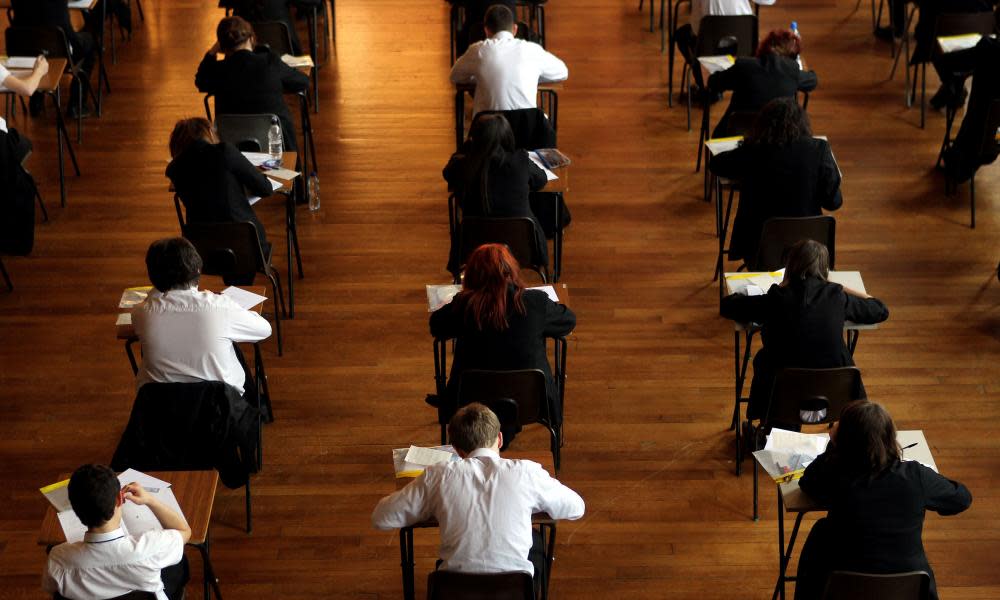Exam boards told to expect surge in requests for GCSE re-marks

Examination boards are being warned to expect a surge in the number of requests for re-marks following the publication later this week of GCSE results that are predicted to be the most volatile in years.
More than 600,000 pupils in England will find out on Thursday how they fared in reformed GCSEs in maths, English literature and English language. The exams are being assessed using the new scale of 9 to 1, which replaces the old A* to G grades.
Schools have been told there will be greater volatility in results because of the changes to course content as well as the new grading system, and many in the sector are predicting more challenges to individual marks as a result.
Philip Nye, a researcher with the thinktank Education Datalab, said: “With all of the changes this year, it’s quite likely that there’ll be more requests for re-marks. And we might see more of these requests for re-marks coming from top independent schools – with pupils, parents and the schools themselves keen to bag every 9 they can.”
There is likely to be dispute at the top end of the scale, where far fewer 9s will be awarded than A*s to try to increase the differentiation between the best-performing students. This year an A will equate to a 7, and the old A* will be split between an 8 and 9 – a move that will result in disappointment for many.
“If your sister got a string of A*s and you’ve been told you’re just as bright and you get 7s and 8s, you’re going to feel pretty miserable,” said Geoff Barton, general secretary of the Association of School and College Leaders, who said he expected to see far more requests for re-marks this year.
He said the use of comparable outcomes, which match this year’s results to prior attainment, was expected to keep national results broadly stable, but the sector had been warned to expect greater variation between schools as they get to grips with the new qualifications with varying success.
Teachers who have taught the reformed GCSEs that are being assessed for the first time this summer have complained about working in the dark with a totally new syllabus and few training materials or practice papers for pupils.
In addition, coursework and continuous assessment have been removed from the qualifications, which are now tested by end-of-year exams, and the content itself is more challenging. In English literature, for example, pupils are no longer allowed to take the text of a poem into the exam, but are required to learn it by heart.
The new maths GCSE – dubbed “fat maths” because of expanded content, which some say is more like one and a half GCSEs – is also more difficult. Peter Hyman, executive head teacher of School 21 in east London, tweeted at the time of the exam: “[Whose] clever idea was it to set a maths GCSE so hard that even the most able come out depressed they can’t answer 1/3 of the questions?
“And don’t tell me it’s all fine because they’ll adjust the grade boundaries – it still makes pupils feel they’re failures.”
Nye said: “It’s a huge issue in terms of an individual’s experience. There’s going to be a lot of kids who feel they’ve not done very well because they haven’t got the top grade, which they previously would have done.
“For independent schools, that’s going to be a difficult message for them to have to explain to parents. There have been conversations, trying to prepare them along the lines of: ‘Your child is very academic, but is not going to get the top grade because there’s very few of them being handed out,’ when previously these would have been straight-A* students. It will be a very emotive issue.”
There has also been confusion around the national benchmark for a pass, which under the old grading system is a C and under the new system is a 4, though some universities, colleges and employers may insist on a 5, which is described by the government as a “strong pass”.
And some experts are warning that the expanded grading system and uncertainty around grade boundaries will lead to an increase in the proportion of pupils who receive an unreliable grade, falling on the wrong side of the boundary.
Michelle Meadows, Ofqual’s executive director for strategy, risk and research, responded: “New GCSEs have been designed from first principles to deliver better differentiation on the new 9 to 1 grading scale. The new GCSE exams and mark schemes have been created to support the increase in the number of grades, with better spread of grade boundaries and reliable assessment.”
This is the first year the new GCSEs, introduced by the former education secretary Michael Gove, have been examined. The reformed qualifications are being brought in over a number of years; a further 20 reformed subjects will have 9 to 1 grading in 2018, with most others following in 2019. During the transition period, students will receive a mixture of letter and number grades.
Mary Bousted, general secretary of the Association of Teachers and Lecturers, said: “These new qualifications in maths and English have been bedevilled by late notice of syllabus, lack of training materials for teachers and lack of practice papers for students.
“Ofqual will do their level best to try to keep this show on the road, and to provide as much equivalence as they can in terms of year-on-year results. But it’s mad – there is no equivalence between the numerical 1 to 9 system and the A* to G grading system.”

 Yahoo News
Yahoo News 
